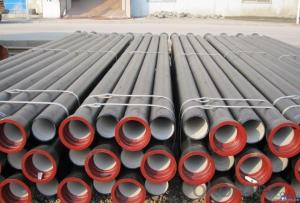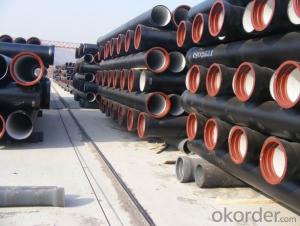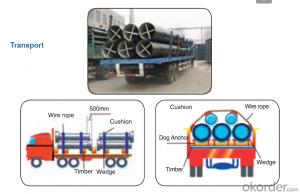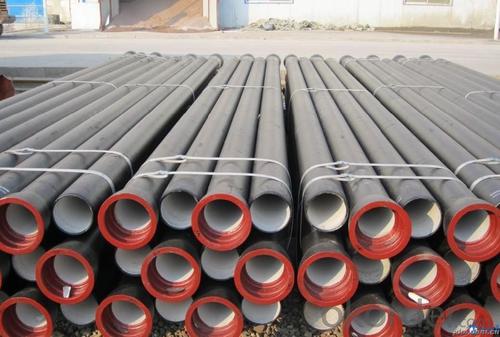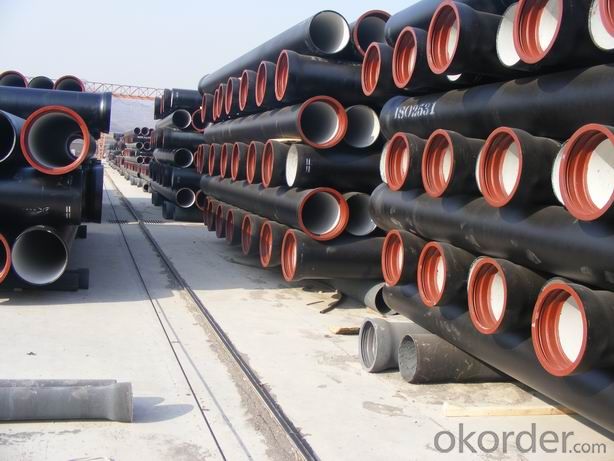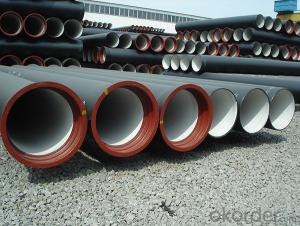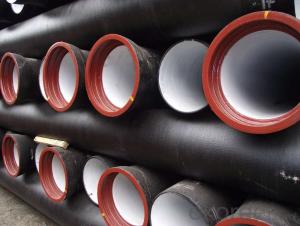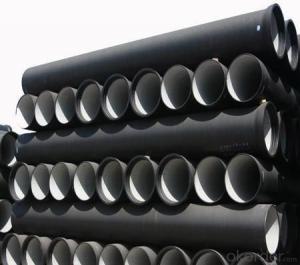Duct Iron Pipe DI Pipe ISO 2531 DN 80-2000mm PN 25
- Loading Port:
- Tianjin
- Payment Terms:
- TT OR LC
- Min Order Qty:
- 100 m
- Supply Capability:
- 100000 m/month
OKorder Service Pledge
OKorder Financial Service
You Might Also Like
Specification:
1. size : DN80-DN2000 available with PN16 or PN10 or PN25 flanges
2.Standard : ISO2531/EN545/EN598/AWWA standard
3. WRAS Potable Water FBE Internal Lining
4.Material : Ductile iron
5.Technical: Casting
6. Type: Socket / flange PN10 / PN16 / PN25
7. Length=6m, 5.8m
8. Coating: Fusion bonded epoxy to 300 microns Dry Film Thickness
Portland cement lining internally and zinc-rich paint with not less than 70 microns bitumen externally
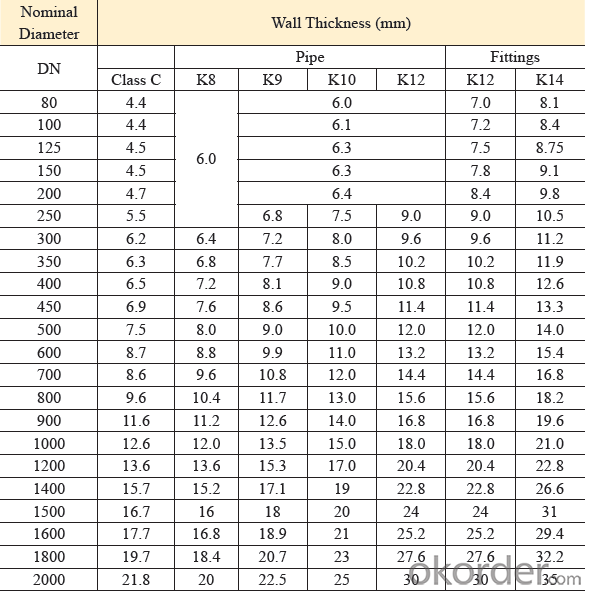
Quality:
ISO 2531 or EN 545 Standard K9 Class, K12 Class
1. ISO 9001 Certificate
2. ISO 2531 & EN 545 Certificate
3. WRAS Potable Water Certificate for FBE Internal Lining
4. WRAS EPDM Rubber Gasket or NBR Rubber Gasket
5. DN80mm - DN2000mm
6. Black Bitumen or Blue FBE / Epoxy Coating
7. Lengh = 6m or cut into 5.6m, 5.7m, 5.8m
8. Client's Brand Customization Allowable
9. Container or Bulk Loading / Shipping
10.Delivery within one Month or According to Client's Order Quantity
11. Support Client or The Third Party Inspection before Shipment
Standard Lining and Coating:
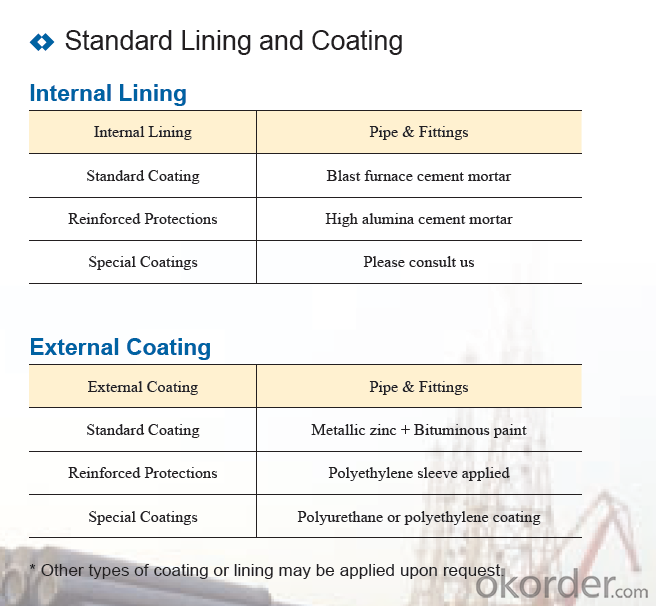
Transport:
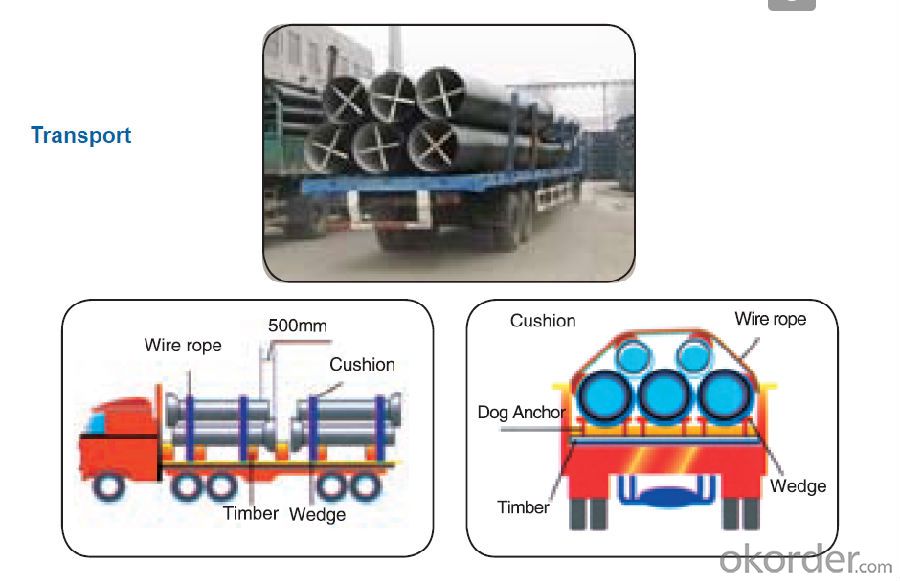
- Q: Why is the sound speed of nodular cast iron lowered after heat treatment?
- Sound travels faster in a solid than it does in a liquidOr so, after heating, the intermolecular repulsion decreases, so that the same potential energy conduction requires molecules to move more distances, making the transmission slower
- Q: Can ductile iron pipe be used for wastewater treatment plants?
- Yes, ductile iron pipe can be used for wastewater treatment plants. Its durability, corrosion resistance, and high strength make it a suitable choice for handling the harsh and corrosive environment of wastewater treatment processes. Additionally, ductile iron pipes can withstand high operating pressures and provide long-term reliability, making them an ideal option for transporting wastewater within the treatment plant.
- Q: How are ductile iron pipes protected against abrasion or wear?
- Various methods and protective coatings are utilized to protect ductile iron pipes against abrasion or wear. One commonly employed method involves the application of cement mortar lining on the inner surface of the pipe. This creates a smooth and durable layer that effectively resists the damaging effects of flowing water and other substances passing through the pipe. Furthermore, external protection for ductile iron pipes can be achieved by applying a bituminous or epoxy coating. These coatings act as a barrier, safeguarding against external factors like soil or chemicals that may lead to wear or corrosion. By serving as a protective layer, they prevent direct contact between the iron pipe and the surrounding environment. Moreover, in areas where severe abrasion or wear conditions are prevalent, special linings or coatings can be applied. Polyethylene encasement or polyurethane lining can be utilized to provide enhanced protection against abrasion, especially in regions where the pipe is exposed to high turbulence or abrasive materials. In certain cases, ductile iron pipes can also be reinforced with additional materials such as fiberglass or steel wire to increase their resistance to abrasion or wear. These reinforcements offer an extra layer of protection, strengthening the pipe and reducing the likelihood of damage. Overall, ductile iron pipes are designed with a combination of protective measures to ensure their durability and resistance to abrasion or wear. These measures encompass cement mortar linings, protective coatings, special linings or coatings for severe conditions, and reinforcements. These protective methods play a crucial role in prolonging the lifespan of the pipes and maintaining their functionality even in challenging environments.
- Q: How do ductile iron pipes handle water velocity?
- Ductile iron pipes are capable of handling high water velocities due to their inherent strength and durability. The material's flexibility enables it to withstand the force and pressure created by fast-moving water, making it suitable for applications where high water velocity is a concern.
- Q: Can ductile iron pipes be used in areas with high levels of hydrogen sulfide gas and corrosion potential?
- Ductile iron pipes can be used in areas with high levels of hydrogen sulfide gas and corrosion potential, but it is important to consider certain factors before making a decision. Ductile iron pipes have a high resistance to corrosion, especially when they are properly protected with external coatings and linings. This makes them suitable for environments with moderate levels of hydrogen sulfide gas and corrosion potential. However, in areas with extremely high levels of hydrogen sulfide gas and severe corrosion potential, other materials like corrosion-resistant alloys or specially coated pipes may be more appropriate. It is crucial to conduct a thorough evaluation of the specific conditions in the area to determine the suitability of ductile iron pipes. Factors such as the concentration of hydrogen sulfide gas, the presence of other corrosive elements or chemicals, and the overall corrosiveness of the environment should be considered. Additionally, the local regulations and industry standards must be consulted to ensure compliance and safety. In conclusion, while ductile iron pipes can withstand moderate levels of hydrogen sulfide gas and corrosion potential, a comprehensive assessment of the specific conditions is necessary to determine their suitability. Consulting with experts in the field and considering alternative materials may be required in areas with high levels of hydrogen sulfide gas and severe corrosion potential.
- Q: Are ductile iron pipes resistant to microbiologically induced corrosion?
- Generally, ductile iron pipes exhibit resistance to microbiologically induced corrosion (MIC). Ductile iron, a variant of cast iron, undergoes treatment involving the addition of magnesium to enhance its strength and flexibility. Consequently, this process forms a protective layer on the iron's surface, rendering it less prone to corrosion initiated by microorganisms. MIC arises when specific bacteria, fungi, or other microorganisms interact with the metal surface of pipes, producing corrosive byproducts. Nevertheless, ductile iron generally resists MIC due to the presence of the protective layer, which acts as a barrier, thus preventing direct contact between microorganisms and the metal surface. Furthermore, ductile iron pipes are often coated with cement mortar or other protective coatings, further bolstering their corrosion resistance. These linings supply an additional layer of defense against microorganisms, reducing the likelihood of MIC. Nevertheless, it is crucial to note that the extent of resistance to MIC can vary depending on the specific conditions and environment in which the pipes are installed. Factors such as water quality, temperature, and the presence of certain microorganisms can influence the susceptibility of ductile iron pipes to MIC. Consequently, it is imperative to consider these factors and implement appropriate measures to prevent MIC. This may include regularly monitoring water quality, maintaining the pipes properly, and employing corrosion inhibitors or biocides when necessary.
- Q: The difference between spheroidal graphite cast iron pipe and HDPE water supply pipe
- Because the HDPE pipe flexibility is good, in the face of obstacles or trench excavation in straight pipe laying conditions can not directly, but the ductile iron pipe can not, it is sometimes necessary to use the words such as elbow or tube fittings to connect the transition. In this way, the HDPE pipe is superior to the ductile iron pipe in the pipe fittings.
- Q: What is the expected hoop stress capacity of ductile iron pipes?
- The expected hoop stress capacity of ductile iron pipes varies depending on the size and class of the pipe. However, ductile iron pipes typically have a high expected hoop stress capacity due to their robust and flexible nature, making them suitable for handling high-pressure applications.
- Q: Can ductile iron pipes be used for underground cooling water systems?
- Yes, ductile iron pipes can be used for underground cooling water systems. Ductile iron is known for its strength, durability, and corrosion resistance, making it suitable for various applications, including underground installations. It can withstand the pressure and temperature requirements of cooling water systems, providing a reliable and long-lasting solution.
- Q: How do ductile iron pipes compare to PVC pipes?
- Ductile iron pipes are generally stronger and more durable compared to PVC pipes. They have a higher tensile strength and can withstand higher pressure, making them suitable for more demanding applications such as water mains and sewer lines. PVC pipes, on the other hand, are lightweight, easy to install, and resistant to corrosion, making them a popular choice for household plumbing and irrigation systems. Ultimately, the choice between ductile iron and PVC pipes depends on the specific needs and requirements of the project.
Send your message to us
Duct Iron Pipe DI Pipe ISO 2531 DN 80-2000mm PN 25
- Loading Port:
- Tianjin
- Payment Terms:
- TT OR LC
- Min Order Qty:
- 100 m
- Supply Capability:
- 100000 m/month
OKorder Service Pledge
OKorder Financial Service
Similar products
Hot products
Hot Searches
Related keywords
